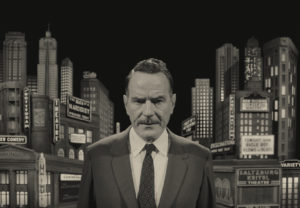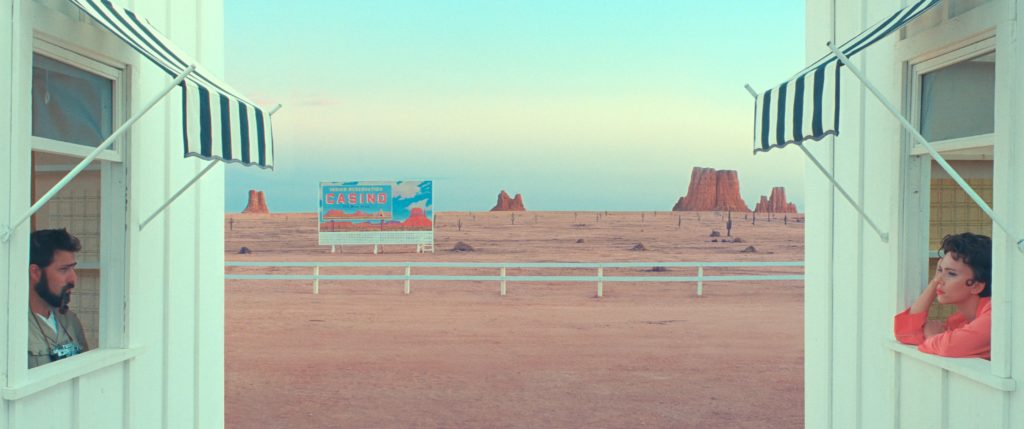“Everything is connected but nothing’s working.”
So says the lone mechanic in lonely “Asteroid City,” one of those dusty desert 1940s pit stops that won’t survive the accroaching interstate system.
He is, of course, diagnosing a broken car. But if everything is indeed connected, as it tends to be on the Pinterest board that is a Wes Anderson feature, then that could easily apply to the broken world itself.
The car belongs to Augie Steenbeck and family, limping into town from a bad engine and the recent death of his wife and their mother. Augie hasn’t told the kids yet, waiting for an opportune moment even he knows will never come. Like everyone else in town, they are here for the Junior Stargazer convention, where little Poindexters show off their inventions to the judges and the sponsoring military-industrial complex.
Alongside the contestants are their families, a school bus full of spectating grade-schoolers, local astronomers, a Marilyn Monroe analogue, and a troupe of singing cowboys. The last visitor is an extraterrestrial, who ironically might be the most down to earth of the bunch. His quick visit is enough to send this whole little microcosm into military quarantine, which resembles COVID-19 quarantines but with less Facebook fights.
If you’re still following, Anderson solves that by adding yet another wrinkle. What we’re watching is a televised production of the stage play “Asteroid City,” and we get intermittent behind-the-scenes peeks of our actors playing actors preparing to play the roles. Even though we oscillate between color and black-and-white photography, it still becomes difficult to track just who is who and where the story ends and reality begins. At some point you just give up, and it is only in this defeat where it all finally makes sense. Everything becomes fiction, but then that fiction all becomes real.

Anderson isn’t new to existential concerns. From the enigmatic Jaguar Shark of “The Life Aquatic” to the wind whistling through the graveyard in “The Grand Budapest Hotel,” Anderson has struggled to reconcile a world where nothing has meaning yet everything means so much. His characters here are no different, their pains even harder to hide on this arid plain. Everyone in town is nursing their own particular hurt; the grown-ups are jaded, which is just another way of saying grown up. Their kids haven’t learned those hard lessons, or even that eventually everyone learns them.
“I feel more at home outside the atmosphere,” one contestant confides to another, one of those mock profundities of youth that cuts closer to the truth than we like to admit.
Anderson doesn’t offer a solution; if he solved the quandary of existence then this movie would probably have opened in more theaters. But like Edison inventing the lightbulb by narrowing down ways it didn’t work, Anderson knows where the answers aren’t. They certainly aren’t outside the atmosphere, yet we feel at home there because there’s nowhere to look but back at earth. If there is meaning to be found, Anderson suggests we search within ourselves rather than in the cosmos, preferably through the expression of art.
The alien brings no message, but perhaps that’s all right. We learn more by what each resident reads into him. It drives some to atheism, others to Episcopalianism. The military see a threat, while the more depressed tenants read sadness on his face, as if he pities mankind and its inevitable doom. In a more unique response, one of the schoolchildren writes a country song with the cowboys titled “Dear Alien (Who Art in Heaven).” The song gets the whole class to up and hootenanny, which is the closest Anderson gets to an endorsement. Art seems like an easier response to mystery than baseless worry, especially when a fiddle is involved.
Truth through fiction keeps popping up. Augie romances the Marilyn Monroe type, each step of their tentative courtship under the guise of helping her rehearse a part. They can say the things they want to say and turn the bases they need to turn only with the permission of the script. Like Binx Bolling in Walker Percy’s “The Moviegoer,” reality only gets its benediction through unreality.
At one point our “actors” perform an exercise in rehearsal, all pretending to fall asleep. Suddenly each bolts awake and yells into the camera, shattering Anderson’s fourth wall. They shout, “you can’t wake up if you don’t fall asleep,” with the fury of indictment and the frequency of a mantra. It’s about as direct as Anderson allows himself to get with his viewers: If you want to find out what’s actually going on, first you must dream. Reality gives us the truth, but it’s often all out of order. When we create, we are simply shuffling the facts back into place.
The most touching example is on the first night of the “performance.” The actor who plays Augie runs out of the scene and to his director. Even with all the rehearsal, he still doesn’t get the meaning.
“Am I doing it wrong?” he quivers.
“It doesn’t matter. Just keep telling the story.”
Unconvinced, he goes out on the balcony and finds the actress who was to play his dead wife, before she and her scene were cut from the play. They run through this gnostic text together, and in doing so Augie finally gets a grasp on his character. There’s nothing supernatural about the encounter, she’s just another understudy after all. But it isn’t a coincidence that salvation only comes from “beyond the grave.” This is intercession, and Wes’ first hint that the world alone isn’t enough.
If the actor finds meaning from a scene outside the play, perhaps we can too. Stephen Park, who plays a father of a young stargazer, plays a different father in the Coen Brothers’ “A Serious Man.” There he commands that film’s existentially racked protagonist to simply “accept the mystery.” God and the alien are in heaven, and they aren’t providing answers anytime soon. You might as well spin your partner round ’n’ round; it’s a blessing just to have someone to twirl.

